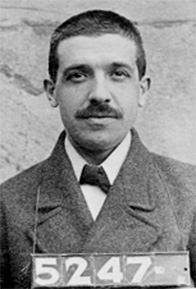Monday, December 15, 2008
Charles Ponzi

Charles Ponzi (March 3, 1882–January 18, 1949) was an Italian immigrant to the United States who became one of the greatest swindlers in American history.
When Ponzi was released he eventually made his way back to Boston. There he met an Italian girl, Rose Gnecco, who was swept off her feet by Ponzi's charm. Though Ponzi did not tell Gnecco about his years in jail, his mother sent Gnecco a letter telling her of Ponzi's past. She remained with him nonetheless and they married in 1918. For the next few months he worked at a number of businesses, before hitting upon an idea to sell advertising in a large business listing to be sent to various businesses. Ponzi was unable to sell this idea to businesses, and his company failed soon after.
A few weeks later Ponzi received a letter in the mail from a company in Spain asking about the catalog. Inside the envelope was an international postal reply coupon (IRC), something which he had never seen before. He asked about it and found a weakness in the system which would in principle allow him to make money.
The purpose of the postal reply coupon was to allow someone in one country to send it to a correspondent in another country, who could use it to pay the postage of a reply. IRCs were priced at the cost of postage in the country of purchase, but could be exchanged for stamps to cover the cost of postage in the country where redeemed; if these values were different, there was a potential profit. Inflation after the First World War had much decreased the cost of postage in Italy expressed in U.S. dollars, so that an IRC could be bought cheaply in Italy and exchanged for U.S. stamps to a higher value. The process was: send money abroad; have IRCs purchased by agents; send the IRCs to the U.S.A.; redeem the IRCs for stamps to a higher value; sell the stamps. Ponzi claimed that the net profit on these transactions, after expenses and exchange rates, was in excess of 400%. This was a form of arbitrage, or profiting by buying an asset at a lower price in one market and immediately selling it in a market where the price is higher, which is not illegal.
Ponzi canvassed friends and associates to back his scheme, offering a 50% return on investment in 45 days. The great returns available from postal reply coupons, he explained to them, made such incredible profits easy. He started his own company, the Securities Exchange Company, to promote the scheme.
Some people invested, and were paid off as promised. The word spread, and investment came in at an ever-increasing rate. Ponzi hired agents and paid them generous commissions for every dollar they brought in. By February 1920, Ponzi's total take was US$5,000, a large sum for the time.
By March he had made $30,000. A frenzy was building, and Ponzi began to hire agents to take in money from all over New England and New Jersey. At that time investors were being paid impressive rates, encouraging yet others to invest.
By May 1920 he had made $420,000. He began depositing the money in the Hanover Trust Bank of Boston (a small Italian American bank on Hanover Street in the mostly Italian North End), in the hope that once his account was large enough he could impose his will on the bank or even be made its president; he did, in fact, buy a controlling interest in the bank. One biographer of Ponzi who wrote eighty years later described the cash price at which the bank's founding family sold their stake as suspiciously high. Having had a fiduciary duty to protect their depositors they were a lasting unindicted beneficiary without direct involvement.
By July 1920 he had made millions. People were mortgaging their homes and investing their life savings. Most did not take their profits, but reinvested.
Ponzi was bringing in cash at a fantastic rate, but the simplest financial analysis would have shown that the operation was running at a large loss. As long as money kept flowing in, existing investors could be paid with the new money, but colossal liabilities were accumulating.
Ponzi lived luxuriously: he bought a mansion in Lexington, Massachusetts with air conditioning and a heated swimming pool, and brought his mother from Italy in a first-class stateroom on an ocean liner. He was a hero among the Italian community, and was cheered wherever he went.
Monday, December 8, 2008
Sunday, November 30, 2008
Friday, November 28, 2008
Thursday, November 27, 2008
Sunday, November 23, 2008
Hubble Finds Extrasolar Planets Far Across Galaxy
 NASA's Hubble Space Telescope has discovered 16 extrasolar planet candidates orbiting a variety of distant stars in the central region of our Milky Way galaxy. The planet bonanza was uncovered during a Hubble survey, called the Sagittarius Window Eclipsing Extrasolar Planet Search (SWEEPS). Hubble looked farther than has ever successfully been searched for extrasolar planets. Hubble peered at 180,000 stars in the crowded central bulge of our galaxy 26,000 light-years away or one-quarter the diameter of the Milky Way's spiral disk. The results will appear in the Oct. 5 issue of the journal Nature. Read more: * NASA Press Release [ http://hubblesite.o…]
NASA's Hubble Space Telescope has discovered 16 extrasolar planet candidates orbiting a variety of distant stars in the central region of our Milky Way galaxy. The planet bonanza was uncovered during a Hubble survey, called the Sagittarius Window Eclipsing Extrasolar Planet Search (SWEEPS). Hubble looked farther than has ever successfully been searched for extrasolar planets. Hubble peered at 180,000 stars in the crowded central bulge of our galaxy 26,000 light-years away or one-quarter the diameter of the Milky Way's spiral disk. The results will appear in the Oct. 5 issue of the journal Nature. Read more: * NASA Press Release [ http://hubblesite.o…]NASA [ http://www.nasa.gov/],
ESA [ http://www.spacetel…],
G. Bacon (STScI [ http://www.stsci.ed…])
Tuesday, November 11, 2008
Friday, November 7, 2008
Saturday, November 1, 2008
Abner Mikva
Thursday, October 23, 2008
Tuesday, October 21, 2008
Bufo holdridgei

Listed as Extinct because it has not been recorded since 1986, and regular surveys since 2000, and extensive searches over the last seven years (to 2007), at the appropriate times in suitable habitats, have failed to locate this species.
IUCN (Red List) status: EXTINCT
Monday, October 6, 2008
Prionailurus viverrinus
 "A species can't be declared nearly extinct
"A species can't be declared nearly extinctuntil it has been declared totally cute"
Prionailurus viverrinus (Fishing Cat) has been declared endangered by the
International Union for Conservation of Nature.
And it has just been declared totally cute.
Tuesday, September 30, 2008
Joe Biden

Vice Presidential candidate Joe Biden has been preparing for this Thursday's debate with Michigan's Governor Jennifer Granholm as a stand-in for Sarah Palin.

Biden said Granholm had agreed to spend four days with him to help prepare for the Oct. 2 debate in St. Louis.

Biden commenting on his approach to his upcoming debate with Sarah Palin"



















